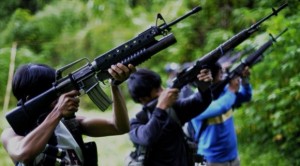NPA says ‘lack of coordination’ led to attack on Agusan governor
DAVAO CITY — On the celebration of its 46th anniversary, the New People’s Army (NPA) claimed responsibility for the attack on the convoy of Agusan del Norte governor Maria Angelica Amante-Matba in Nasipit town on Thursday.
In a statement, Allan Juanito, spokesperson of the NPA’s North Central Mindanao Region, said communist guerrillas under the NPA-Western Norte-Agusan Sur Command opened fire at the six-vehicle convoy not knowing the governor was there.
READ: Military goes on red alert vs Reds
Juanito then apologized for the incident blaming lack of coordination for the attack on civilians.
“We earnestly express our regret to this event. It should have been circumvented should there have been prior coordination by the governor’s party with the responsible revolutionary cadres in the said territory,” the spokesperson said.
Article continues after this advertisementThe military earlier reported that the convoy was going to the turnover of a school in the village of Camagong when they were waylaid and fired upon by members of the NPA.
Article continues after this advertisementA policeman was wounded in the attack and was rushed to a hospital in Butuan City.
READ: 2 unarmed soldiers shot dead by NPA rebels
Juanito said, “Six-convoy vehicles of Gov. Amante entered along with armed escorts in Kamagong area despite an ongoing operation by 29th IB troop and PNP-Nasipit personnel in the boundary of Carmen and Nasipit towns.”
He reminded politicians to avoid bringing armed escorts in areas identified as territories of the communist movement.
“We would just reiterate our notice to politicians and personalities entering our base areas … to refrain from bringing their arms, and if carrying such be necessary, to coordinate with the respective personnel in the territory so that a proper permit would be issued,” Juanito’s statement said.
He added, “It is also appropriate for them upon entry to investigate beforehand whether combat operations of AFP and PNP are ongoing in order to evade from being unnecessarily caught in the crossfire once an armed encounter takes place.”
Peace advocates have been calling on the government and the National Democratic Front (NDF) to resume peace negotiations to address the root causes of the conflict that has caused numerous casualties and damage to properties.
In the Hague Joint Declaration in 1992, both parties agreed to tackle substantive agenda including human rights and international humanitarian law, socio-economic reforms, political and constitutional reforms, end of hostilities and disposition of forces.
In March 1998, both parties signed the Comprehensive Agreement on Respect for Human Rights and International Humanitarian Law (CARHRIHL).
The government and the NDF have already formulated their drafts for the Comprehensive Agreement on Socio-Economic Reforms (Caser) but have not made progress since the talks collapsed.
The NDF is asserting that the government should release political prisoners and NDF consultants that were captured by government forces as agreed upon by the previously signed agreements to jumpstart the stalled talks.
The NPA led by the Communist Party of the Philippines, which is fighting a guerrilla war for more than four decades, is known for sustaining one of the longest running communist rebellions in Asia.
